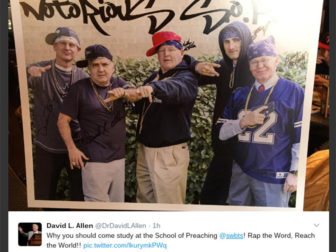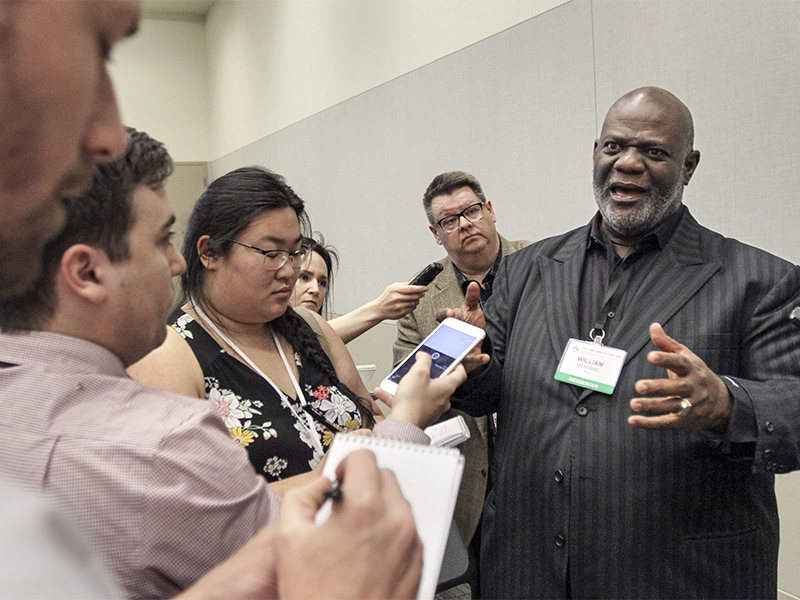(USA Today) A black Oklahoma State University lecturer says he is renouncing his ordination as a Southern Baptist minister because of the racism he sees within the country’s largest Protestant denomination.
Other black Southern Baptist leaders acknowledged the sentiment Lawrence Ware expressed in his New York Times column, published Monday (July 17). But they say staying a part of the Nashville, Tenn.-based Southern Baptist Convention allows them to help the network of churches continue to move toward racial reconciliation, a high-profile issue it has dealt with in recent decades.
[ad number=“1”]
The Bible calls for unity, said the Rev. Byron Day, president of the National African American Fellowship of the Southern Baptist Convention.
“The SBC has some racist people in it, but so does other denominations as well,” Day said. “I am one that believes that it’s better not to leave, but rather to stay and help educate other brothers and sisters about problems, whether it be racism or some other issue.”

A controversial photo of five Southwestern Baptist Theological Seminary professors posing as rappers. Screenshot from Twitter
Ware, who is not a well-known minister but serves at Prospect Church in Oklahoma City, told the USA Today Network that he didn’t make his decision lightly or quickly.
In addition to the denomination’s pro-slavery roots, he pointed to a series of recent incidents that led to his departure, including a controversy at Southwestern Baptist Theological Seminary that involved white professors dressing up as rappers.
“I understand the logic behind wanting to stay inside an institution and make changes from the inside. … That motivation is noble in some instances, but it’s also enabling in others,” Ware said. “I just came to a place where I couldn’t stay in.”
Ware’s tipping point came last month when the Southern Baptist Convention did not immediately disavow white supremacy during its annual meeting in Phoenix. He did not attend the two-day event, and Day pointed out that Ware may not have the full picture of what happened as a result.
The resolutions committee initially rejected a resolution opposing the alt-right movement, a term often applied to those whose political views embrace white nationalism, racism and anti-Semitism.
Committee members raised concerns about the resolution’s language, and the full convention voted not to overrule the committee. Tense discussions and national media attention ensued; leaders crafted a new resolution and it passed.
READ: In dramatic turnabout, Southern Baptists condemn white supremacy
Day thinks the resolutions committee made a mistake by not amending the first resolution and bringing it to the floor for a vote initially.
But he called the resolution that eventually passed the strongest effort the Southern Baptist Convention has made concerning racism to date.
[ad number=“2”]
“We can only keep talking about it. Keep preaching about it. Keep encouraging all of our churches to speak out against it. That’s all we can really do,” said Day, who also is the pastor of Emmanuel Baptist Church in Maryland. “By the grace of God, we hope to see our convention get better at it.”

Lawrence Ware, a minister with Prospect Church in Oklahoma City. Photo courtesy of Oklahoma State University
The Rev. Dwight McKissic, the Texas pastor who wrote the original anti-white-supremacy resolution, said he respects Ware’s decision to go, but he stays because of all the good the convention accomplishes, such as church planting and financial support.
But he wants more black Southern Baptists in denominational leadership roles and for the convention to denounce the “curse of Ham,” a religious theory that justified the basis for slavery and segregation. It was in his resolution, but not the one the convention passed.
“I think the Southern Baptist Convention is worth trying to bring healing and hope,” said McKissic, who is the pastor of Cornerstone Baptist Church. “The majority of the people’s hearts are in the right place, but there is still some work to be done.”
Ware, who also is co-director of his university’s Center for Africana Studies and the diversity coordinator for its philosophy department, will continue to be a minister at Prospect Church.
The church is aligned with the Southern Baptist Convention as well as the Progressive National Baptist Convention. Ware will continue to associate with the latter but told his pastor he would no longer be involved with the church’s Southern Baptist Convention-related work. (In the Southern Baptist Convention, ordination is a local church matter. The denomination doesn’t ordain or license ministers.)
[ad number=“3”]
Ware wrote that he knows of five others who have quietly left the denomination over the past year. He purposely made his departure public and announced it in a national publication as a way to push the Southern Baptist Convention to confront it.
“Me doing that quietly will not force them to come to terms with the lived experience of people of color in that denomination,” Ware said. “I think that more needs to be done to substantively change the culture of SBC, and I wish them the best.”
McKissic said he does think Ware’s column shed a public light on concerns raised privately by some Southern Baptists, and the mishandling of the alt-right resolution forced many black Southern Baptists to question whether they should stay. He said he knows about five people who quietly walked away, and he convinced about seven others to remain.
The Rev. Kevin L. Smith, executive director of the Baptist Convention of Maryland and Delaware, said he is not aware of anyone closely connected to Southern Baptist life who has left. While moved by the painful story Ware shared of being called a racial slur at a Southern Baptist camp, Smith took issue with the conclusions Ware drew in the column.
But Smith does think the resolutions committee should have worked through the wording of McKissic’s initial resolution, recognizing it was an important issue for some Southern Baptists. Not doing so illustrates the challenge faced by a denomination with millions of people in it.
“That was something that was burdensome to a portion of the convention and there were other parts of the convention that just didn’t seem to realize how burdensome that was to some other brothers and sisters,” Smith said.
(Holly Meyer writes for The Tennessean)





